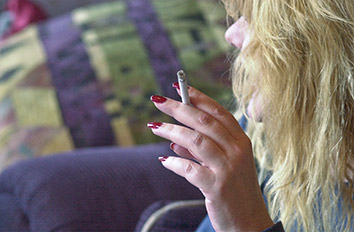Subscriber Benefit
As a subscriber you can listen to articles at work, in the car, or while you work out. Subscribe NowA new study commissioned by the Richard M. Fairbanks Foundation says employees who smoke cost Indiana employers an estimated $3.1 billion annually in lower productivity and higher health care costs.
The Indianapolis-based foundation said the study, announced Thursday, shows that if the state cigarette tax increased by $2 per pack, from the current 99 cents per pack, an estimated 45,000 Hoosier adults would stop smoking. Raising the tax would also provide the state with an additional $356 million in revenue, the study estimated.
The foundation said worker absenteeism due to smoking and unsanctioned smoking breaks serve as an additional “hidden tax” to businesses equaling 1.7% of total wages. Of the $3.1 billion estimated annual cost, Marion County businesses paid $609 million.
Smoking affects worker productivity, increases the number of days workers are absent and drives health care costs higher, the study said.
“We’ve long known that smoking severely impacts Indiana–both in lives lost and in higher health care expenses, but smoking’s cost on businesses is lesser-known,” said Claire Fiddian-Green, president and CEO of the Richard M. Fairbanks Foundation. “Today’s report makes it clear: our state’s high smoking rate also significantly impacts employers’ bottom line.”
Fiddian-Green said the state has made progress over the last decade to reduce tobacco consumption, but Indiana still has the eighth-highest smoking rate in the U.S. at 17.3%. The national average of 14.4%.
The annual costs for these impacts include:
- $283 million for lost productivity, as Indiana smokers work between 1.9% and 4% less per year than non-smokers.
- $272 million for absenteeism, as Indiana smokers are absent from work 2.5 more days than non-smokers each year.
- $1.7 billion for smoking breaks that are separate from allocated break times.
- $757 million that self-insured Indiana employers pay due to higher health care costs for smoking-related illnesses such as heart disease and cancer.
The foundation said the $3.1 billion annual cost to employers it likely a low estimate.
“Smoking-related costs undermine the success of employers and threaten to hinder Indiana’s ability to attract and retain companies,” Fiddian-Green said. “In short, high smoking rates are a drag on our state’s economy.
The study was conducted by researchers at the University of Illinois at Chicago.
The report can be found on the foundation’s website.
Please enable JavaScript to view this content.


I agree that this is a real problem and hurts both businesses and people but find it ironic that the state does not address the “hidden costs” of other drugs, namely alcohol. How can tobacco be any worse than alcohol consumption? Also, if we truly care about the physical and mental health of Hoosiers and the overall health of our state, why would the legislature study the merits of legalizing marijuana? Seems extremely hypocritical to me. Be honest, it is all about the money!
So we pass taxes in order to help businesses? I thought the government was supposed to be looking out for the people.
Ah, but this also would drive additional revenue for themselves…..
Why don’t businesses just pass a rule that says their employees can’t smoke while they are on the clock. Problem solved. Of course, going to the bathroom also reduces business productivity, so will there be a tax on using the toilet?
I really detest smoking, but this tax seems very “tea party” wrong.
An insidious habit. How many will quit if they raise the tax to $10 a pack? Do it!
According to the report, “Estimates indicate that a 10% increase in cigarette prices reduces overall cigarette consumption by about 4%.” Basically, they admit cigarette demand is inelastic to price increases, yet they’re pushing for it anyways.
The report also says Indiana’s smoking prevalence rate is 21% = 1.2M people. The tax will reduce the number of smokers from 1.2M down to 1.155M; a drop in the bucket. They even acknowledge the cigarette tax is regressive and will harm lower income families disproportionately. I don’t believe these PhD policy wonks are intentionally harming children, but are absorbed in their own self-righteousness.
The problem is the State of Indiana doesn’t want to spend money on public health programs that work – getting adults to see their doctor for an annual visit and interactive drug use prevention programs in schools for children.
Let’s do nothing because it will only save a few thousand people? Is that what you’re saying? Very Republican of you.
For the last 6-8 years these so called studies have continued to blow rationalized smoke numbers up our pants. If I remember correctly it was first $1B, then $2B and the last couple years $3Billion. The studies seem to be concluded before any real scientific research has formed a conclusion. As a 30 year business owner, I found my smoking staff were actually more productive after a smoke break. They also hung out less than non-smokers in the break and coffee room. They also showed up on time and had less excuses for being late. I do not endorse smoking, but these numbers Fairbanks share have no facts to them, just estimated mathematics of personnel times breaks. Did these studies consider obesity, alcoholism, basic irresponsibility, and bad diets into their numbers? I doubt it. Lost production and absenteeism are somewhat of a human trait more than a smoking habit. Another excuse for some to tax others.
You must not pay attention to the nonsmokers. As a non-smoker, I was always irritated and amazed at the number of times I would go to talk to a smoking co-worker and they were away from their position “on a smoke break “. If ano, I think they have underestimated the amount of lost work time for smoke breaks.
Anything not ano.
Smoking is filthy, disgusting and ridiculous.
Cigarette butts are toxic. Primarily made of plastic. And contribute to one-third of all littering.